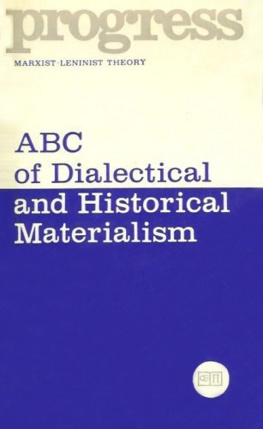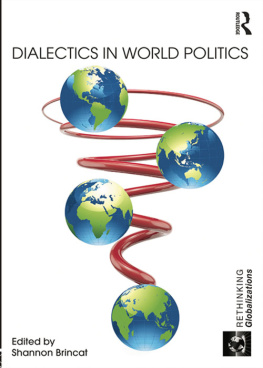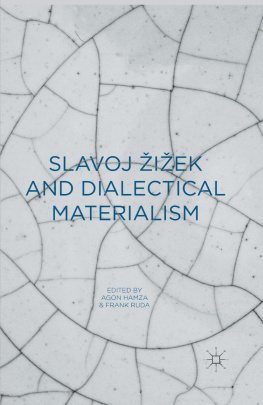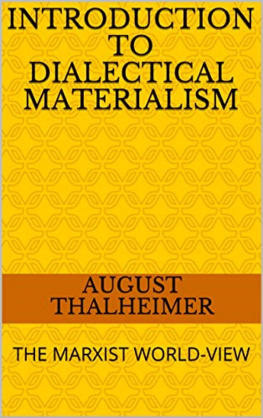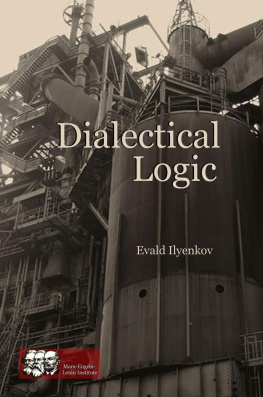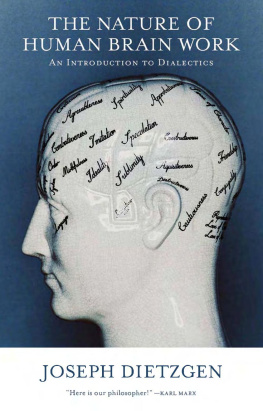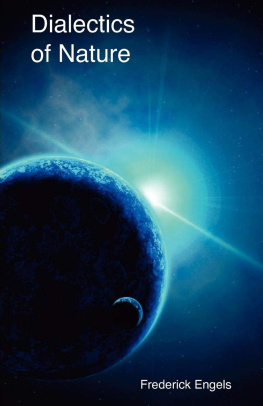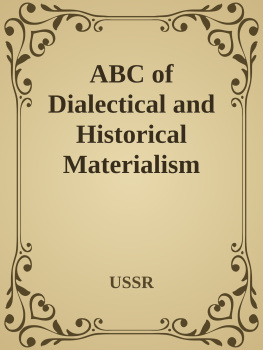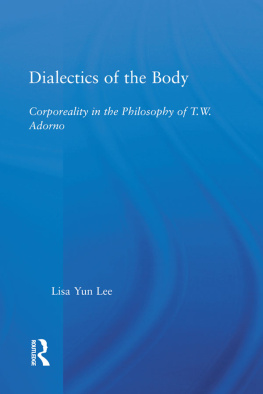B.M. et.al. Boguslavsky - Abc of Dialectical and Historical Materialism
Here you can read online B.M. et.al. Boguslavsky - Abc of Dialectical and Historical Materialism full text of the book (entire story) in english for free. Download pdf and epub, get meaning, cover and reviews about this ebook. year: 1976, publisher: Progress Publishers, genre: Science. Description of the work, (preface) as well as reviews are available. Best literature library LitArk.com created for fans of good reading and offers a wide selection of genres:
Romance novel
Science fiction
Adventure
Detective
Science
History
Home and family
Prose
Art
Politics
Computer
Non-fiction
Religion
Business
Children
Humor
Choose a favorite category and find really read worthwhile books. Enjoy immersion in the world of imagination, feel the emotions of the characters or learn something new for yourself, make an fascinating discovery.
- Book:Abc of Dialectical and Historical Materialism
- Author:
- Publisher:Progress Publishers
- Genre:
- Year:1976
- Rating:5 / 5
- Favourites:Add to favourites
- Your mark:
- 100
- 1
- 2
- 3
- 4
- 5
Abc of Dialectical and Historical Materialism: summary, description and annotation
We offer to read an annotation, description, summary or preface (depends on what the author of the book "Abc of Dialectical and Historical Materialism" wrote himself). If you haven't found the necessary information about the book — write in the comments, we will try to find it.
Abc of Dialectical and Historical Materialism — read online for free the complete book (whole text) full work
Below is the text of the book, divided by pages. System saving the place of the last page read, allows you to conveniently read the book "Abc of Dialectical and Historical Materialism" online for free, without having to search again every time where you left off. Put a bookmark, and you can go to the page where you finished reading at any time.
Font size:
Interval:
Bookmark:
This book presents in a popular form the fundamentals of Marxist-Leninist philosophydialectical and historical materialism. It is intended for the people who are studying philosophy and are trying to understand the problems of our day.
A uthors:
B. M. Boguslavsky , Dr. Sc. (Philosophy)
V. A. Karpushin , Dr. Sc. (Philosophy)
A. I. Rakitov , Dr. Sc. (Philosophy)
V. Y. Chertikhin , Cand. Sc. (Philosophy)
G. I. Bzrin , Cand. Sc. (Philosophy)
Lenina Ilitskaya (Translat or )
Many people are trying their best to grasp the meaning of the rapid changes occurring before their eyes and to understand how they are affecting their own lives. They are trying to develop their own view of the world and thus determine their place in it. But it is not simple to form a view of the world without knowledge of existing doctrines and theories. There are diverse theories explaining, each in its own way, the events occurring in the world. And it is vital, though not at all easy, to choose among them the one that is nearest to the truth and that is borne out by life, by the development of science and the real course of history.
The authors will consider their task rewarded if this book helps the reader to comprehend the phenomena and events in nature and society and to form a scientific, Marxist world outlook.
In March 1881, a man jailed for his active Opposition to the tsarist autocracy sat over a sheet of paper in a solitary confinement cell in the Peter and Paul Fortress in St. Petersburg, now Leningrad. The death sentence had already been passed on N. I. Kibalchich, and the day of his execution was not far off. But it was not of his doom he was thinking: his mind was on a fascinating scientific problem to which he had only just, so shortly before his early death, found a solution. There, on the sheet of paper, was the scheme of a jet-propelled aircraft, the first in the history of science.
Twenty-two years afterwards, in 1903, the eminent Russian scientist K. E. Tsiolkovsky, who had elaborated in detail the design of the jet-propulsion engine, laid the foundations of jet-propulsion theory and demonstrated that jet-propulsion engines could be used for interplanetary flights. Thirty years later, flying vehicles with jet engines were constructed and tested. Soon jet planes appeared, and in 1957, the first artificial earth satellite was launched in the USSR. Following a series of unmanned space flights, the first manned spaceship with the Soviet cosmonaut Yuri Gagarin on board was successfully launched.
That started a new age. Jet-propelled spaceships set off for the Moon, Venus and Mars. It could never have happened had the human mind not conceived the principle of jet propulsion and developed relevant scientific theory, and had it not posed to men the task of penetrating space. All man-made cosmic bodies are the products of scientific thought. And as thought need not necessarily be unique to earth-dwellers and there may be other beings in the universe who may well be our intellectual superiors, it is natural to suppose that other cosmic bodies whose origin is so far not clear to us may also be products of thought. Then why not suppose that the Earth with everything there is on it is also a product of thought?
One could indeed make such a supposition but would it tally with the evidence of science and experience?
Light travels 9, 440, 000, 000 kilometres a year. This distance is called a light-year. The Milky Waya giant cluster of stars and other bodies, of which the solar system is a parthas a diameter of almost 100, 000 light-years. It moves among other clusters of stars (galaxies) which are vastly removed from it. The part of the universe which scientists can observe with the aid of powerful optical and radio devices has a diameter of 26, 000, 000, 000 light-years. This vast area is puny, compared with all other areas of the universe as yet out of the range of the available means of observation. And the Earth, with its continents and oceans, plants, animals and human beings, is an infinitesimal speck in the vast universe.
According to scientific evidence, life on Earth has existed but a short time compared with the Earths existence, while the living organisms make up but an insignificant part of the sum total of bodies we call the Earth. As for the human race, it is relatively young, having appeared just a little over a million years ago. Space flights and scientific research have conclusively established that between the Earth and its natural satellite, the Moon, no living organisms exist, let alone rational beings.
Hence, although the universe evidently contains an infinite multitude of life forms, only a very small part of them possess the faculty of thought. Modern science confirms Engels observation that the time of organic life and still more that of the life of beings conscious of nature and of themselves, is just as narrowly restricted as the space in which life and Self-consciousness come into operation.
Modern science suggests that thought is merely one of the numerous products of the universe. The supposition that the universe, which is infinite in space and time, is the product of thought is hardly tenable. Supporters of this view may argue that our scientific knowledge is anything but complete, there being still much that we do not know. That is true enough. Yet, ignorance is no argument.
We have thus come to a point which merits close consideration. To form an idea of a science, one should, first of all, be informed of the basic problems it is concerned with. In chemistry, for instance, the question of how atoms join and separate and how, as a result, substances undergo changes of composition, is basic to all other questions. Knowing this, we can already form a basic idea of the science of chemistry. It is so with all other sciences. To know the fundamental question a science i s concerned with, is to know what it is about. Hence, in order to form an idea of what philosophy is, we must find out what its fundamental question is.
All bodies and the mechanical, physical, chemical and physiological processes they undergo are usually described as material phenomena, or matter . Pride, shame, joy, and all other feelings supplied by our five senses, as well as thoughts teeming in the mind are usually described as ideal, or spiritual phenomena or consciousness .
It has long been observed that mans capacity to distinguish colours, sounds and smells, as well as his feelings and his mind improve with age, as his body develops and as he learns to perform diverse jobs, handling different objects and associating with other people. Some grave bodily diseases cause aberration or even loss of consciousness while with the destruction of the body sensations, thoughts cease altogether. These facts show that spiritual phenomena are based on material phenomena.
Other facts have also been noted. When we say that a boy has smashed a window without meaning to, the idea is that he did not intend to smash it. This does not, however, mean that the hand threw the stone of its own accord, irrespective of the boys intention. Clearly, his action was prompted by some emotion or idea. He simply did not aim the stone well and it hit the wrong object.
Man is not a machine but a creature that thinks and feels. All his actionsreasonable or otherwiseare prompted by his emotions or ideas. Before making a plough and tilling and sowing the field he thinks over how it should all be done.
The desire for freedom and anger at social injustice long ago caused slaves to rise up and fight their oppressors. Love of their country moved men to fight invaders to the death. The immediate source from which such actions sprang were, again, mens ideas and emotions.
Font size:
Interval:
Bookmark:
Similar books «Abc of Dialectical and Historical Materialism»
Look at similar books to Abc of Dialectical and Historical Materialism. We have selected literature similar in name and meaning in the hope of providing readers with more options to find new, interesting, not yet read works.
Discussion, reviews of the book Abc of Dialectical and Historical Materialism and just readers' own opinions. Leave your comments, write what you think about the work, its meaning or the main characters. Specify what exactly you liked and what you didn't like, and why you think so.

